When I returned from the USA I
tried to get over my experience with Welles by devoting my time
mainly to distribution. At the time I worked with Cineteca, S.A.,
which intended and actually managed to become a prestigious company
in promoting original language films. With the help of an old
veteran fighter in distribution, Fernando Vidal, I established a
network of agents throughout Spain; people who operated in specific
geographical locations and devoted themselves with fervor to the
launching of films. I managed to launch films that were very
successful, like the Argentine movie "La Raulito"(Little Raoul), or
"Padre Padrone" (Father and Master), directed by the Taviani
Brothers and which obtained a Golden Palm in Cannes. "El árbol de
los zuecos" (The Tree of Wooden Clogs), by Ermanno Olmi, also
obtained a Golden Palm, as did another three of the films that I
promoted - five Golden Palms altogether in consecutive years. I
soon decided to apply that distribution network to Spanish films
and started off by distributing "Morbo" and "Al diablo con amor",
both directed by Gonzalo Suárez.
Gonzalo, a great writer and
director, famous for "Las diez de hierro", is one of the most
intelligent and amusing personalities of Spanish cinema. From the
day we first met at the Rincón de la Ternera for lunch, we got on
well together; he asked me to enter into a partnership with him.
Such a partnership - from which he has wanted to pull out several
times - has yielded movies, TV series and a great friendship. "La
loba y la paloma" (The Wolf and the Dove), "Remando al viento"
(Rowing with the Wind), "Los Pazos de Ulloa" (The Manors of Ulloa)
and "El portero" (The Goalkeeper) were some of our works. "La loba
y la paloma" was to be coproduced by famous Spanish singer Victor
Manuel with Ana Belen playing the leading role in the cast. Victor
Manuel had already been Gonzalo's partner in previous films.
However, due to a couple of misunderstandings and difficulties
arising from the pressure which the Franco government applied to
Spanish singers, Víctor and Ana resigned to participate financially
in the project. Disappointed by this decision, Gonzalo and I decide
to have Ana Belen replaced by a young French actress, Muriel
Catalá, with Carmen Sevilla, Donald Pleasence and Michael Dunn as
part of the cast. Donald was somewhat famous then for having
starred in "The Night of the Generals," directed by Anatole Litvak,
and his participation in the cast as well as that of other foreign
actors were part of my efforts to design an international product.
It was total craziness at that time because we were trying to sell
the movie as if it were a genre film when in fact it was a pure
auteur film. Donald and Michael spent some very pleasant weeks in
Spain and actually enjoyed their work, but I doubt they were able
to understand what Gonzalo had in mind and was intending to do.
With "La loba y la paloma" I started to produce films that were
more Spanish in terms of concept, with which I tried to penetrate
the international market. I was aware of the fact that to come up
with a solid project of endeavors one needed to consolidate his
position in his own market.
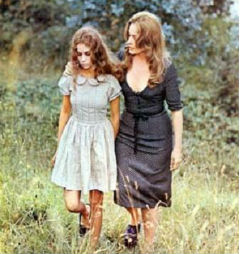 Almost at the same time I prepared and filmed "El
asesino no está solo" (The Assassin is not Alone), directed by
Jesús García de Dueñas, a film critic and the (then) husband of
actress Charo López. I don't recall how I got in touch with Jesus.
I do remember though that the story was inspired on an American
script written by Harry Horner, which was never turned into a movie
and was handed to me by Bob Lewis, an American producer who resided
in London. Jesús Torbado, whose first novel, "Las corrupciones", I
had tried to adapt to the screen and with whom I had established a
good relationship, was given the task of developing the script. We
hired Lola Flores and gave a second opportunity to Teresa Rabal,
who had made her debut with me in "El complot de los rebeldes" (Le
Complot).
Almost at the same time I prepared and filmed "El
asesino no está solo" (The Assassin is not Alone), directed by
Jesús García de Dueñas, a film critic and the (then) husband of
actress Charo López. I don't recall how I got in touch with Jesus.
I do remember though that the story was inspired on an American
script written by Harry Horner, which was never turned into a movie
and was handed to me by Bob Lewis, an American producer who resided
in London. Jesús Torbado, whose first novel, "Las corrupciones", I
had tried to adapt to the screen and with whom I had established a
good relationship, was given the task of developing the script. We
hired Lola Flores and gave a second opportunity to Teresa Rabal,
who had made her debut with me in "El complot de los rebeldes" (Le
Complot).
The existing financial system In
Franco's Spain was not available for people like myself and
companies like mine. We were in fact lucky enough to have access to
filming permits that were required to have our co-productions
approved and for the censors to authorize the screening of our
films. A producer's life in those days - except for privileged
filmmakers like: Cesáreo González, Benito Perojo, Manuel Goyanes
and a couple of others- involved shuttling between the bank to ask
for credits, overdrafts and discounted notes receivable, and the
Ministry of Information & Tourism which at the time was located
where the Ministry of Defense stands today.
These films were financed with a
great deal of effort and some money of my own and from my friends,
but above all with advances based on promotion of these and other
foreign films which I managed to obtain over time from my regional
agents - a talent for which, according to all of them, I had a keen
instinct. Curiously enough, during my first 15 years of being
involved in the film industry, people have said that I did not have
much talent as a producer but that I had a knack for discovering
and promoting foreign films. Perhaps because of that, subsequently,
I managed to buy movies like "The Last Emperor", "Dances with
Wolves" and "Driving Miss Daisy" for Spain, all three of which won
Best Picture Oscars in 1987, 1988 and 1989.
In 1974, we shot "The Sky Is
Falling", which later on became "Las flores del vicio" in Spanish.
This project originated as a result of me paying regular visits in
Mojácar (Almería) to Silvio Narizzano and Win Wells. It was based
on a crazy script about the personal experiences of a group of
expatriates living in that little village, where I had many
contacts in the early 1970s. We shot two films there: "Treasure
Island" and "Diabólica malicia" (Night Child), apart from "Las
flores del vicio." Personalities like Julio Feo, Ángela Kutch and
Antonio Bienvenida, the well-known bullfighter, had houses in the
village. There was a street called Calle de los Embajadores where
alcoholic diplomats and homosexuals took refuge from prudish,
intolerant Spain. I associate the early 70s entirely with Mojácar.
As part of filming "The Sky Is Falling," I brought over Dennis
Hopper, who arrived in Madrid with a small shoulder bag and a
round-trip ticket Albuquerque-Madrid-Albuquerque, which I had sent
to him. We took the opportunity of his brief stay in Madrid to show
"Easy Rider" for the first time ever in Spain. The screening was
organized thanks to the initiative of Jos Oliver, who had
significant influence over the director of the Filmoteca (Film
Library). The venue, on Las Infantas Street, was crammed with
viewers.
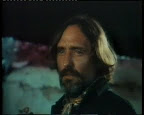
My production company, Eguiluz
Films, and the Cineteca distribution company, operated in the 1970s
in the following way: Cineteca made money distributing foreign
films and Eguiluz lost it with the films I produced. We distributed
all sorts of things, from the Keaton Festivals and Chaplin to
Hungarian films like "Amor" (Love), directed by Károly Makk, and
films directed by István Szabó, Pasolini, Bresson, Resnais and
other great directors as well as opportunistic pseudo-pornographic
films. We achieved considerable commercial success with "Padre
padrone" (Father and Master), "La Raulito" (Little Raoul),
"Libertad sexual en Dinamarca" (Sexual Freedom in Denmark), "Carta
de amor de una monja portuguesa" (Love Letter from a Portuguese
Nun) and "Garganta profunda en Tokio" (Deep Throat in Tokyo). That
explains how, with bank loans completely out of the question to
finance risky ventures like mine, we were able to finance
incredible projects such as "Las flores del vicio" whose cast, in
addition to Dennis Hopper, included Carol Baker and Richard Todd,
as well as Spanish actress Yvonne Sentís.
Finishing the filming was very
difficult; the personal differences between Silvio, Win and Dennis
ended in daily insults in front of an astounded team. We lived an
intense bohemian lifestyle with lots of booze and drugs in Mojácar.
My son Marco, six or seven years at the time, was in the film in
the beginning but was eventually replaced by a stand-in. Obviously
his vocation wasn't acting.
When Franco was in his deathbed, I
started filming "La querida", written by José Manuel Fernández and
Romualdo Molina, heads of the purchase department of TVE, with whom
I had built a relationship by selling my films to Spanish
Television. At the time I was very impressed by the movie
"Darling", starring Julie Christie, and I asked them to do
something along those lines. Rocío Jurado became our Julie,
Fernando Fernán Gómez played the role of John Schlesinger as
director and of Dirk Bogarde as actor. In our story we turned the
model that stars in Darling into a singer. Fernando accepted the
job for "food reasons," an expression he used a lot when he was
hard-up for cash, but the film turned out to be a minor disaster
although very amusing. Manuel Alejandro, a great person and an even
greater musician, composed twelve songs for Rocío which, for 25
years, have been the basis of her repertory. Paco Gordillo, a
prestigious actors' manager who had just split from Raphael, took
care of Rocío and became the film's co-producer. In those days
Rocío was madly in love with her fiancée, Pedro Carrasco, and
terrified about the possibility that he might find out that we
intended to film her innocent naked breasts. In the end, we used a
stand-in, which made Rocío furious.
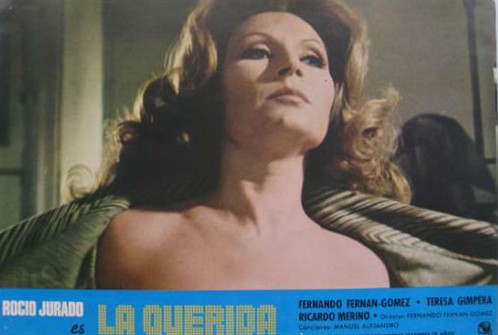
After "La querida" premiered, it
was successful to some extent because a judge in Cordoba prosecuted
me, Fernán Gómez and the scriptwriters for public scandal on the
grounds that we had included in the film's promotional and
advertising material a phrase from an interview with the female
lead in which she told the journalist Pilar Trenas that "In my
village, any fifteen-year old girl who hasn't had a roll in the hay
with a man must be a tomboy."
A year later when the trial took
place in the High Court of Córdoba, we were absolved thanks to our
lawyer, Joaquín Martínez-Bjorkman, who would later become a
Socialist senator. Just as we had finished filming "La querida,"
Franco died and I separated from my wife, Tarja.
Because of that film, I got to know
actress Emma Cohen (who was romantically involved and working with
Fernán Gómez), for whom I produced the short film "Quería dormir en
paz." Emma had directed and written the short film, which was based
on a story by Ignacio Aldecoa, starring Fernando Fernán Gómez and
Manolo Alexandre. Although well made, the film never went anywhere
and had a small viewing audience. It didn't bode well for Emma's
career as a director.
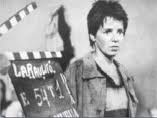
In 1976 and 1977, I didn't do much
as a producer although I was very active as distributor. "La
Raulito" (Little Raoul), an Argentine film I purchased thanks to my
friend Jesús López-Patiño, was quite an event in Madrid. At the
time, I held the position of director in the Film Market of the San
Sebastian Film Festival and had the opportunity of meeting many
Latin American distributors and producers. That took me to Buenos
Aires with Jesús. We have unforgettable memories about that trip. I
became immersed in Argentina for several intensive weeks and met
loads of people. As Jesús remarked, I met several complete
generations of Argentineans. I got close to Leopoldo Torre-Nilsson
and his wife, the writer Beatriz Guido; Raúl de la Torre and the
actress Graciela Borges and directors Héctor Olivera and Francisco
Ayala, all of whom were relevant personalities of Argentine cinema.
I also met army officers, politicians and, above all, soccer
managers, directors and players. I attended a River-Huracán match
in Buenos Aires and an Argentina-Brazil match in Córdoba. My
relationship with Argentina went on and on, to the extent that even
actress Marilina Ross, star of "La Raulito," stayed at my home in
Madrid and I ended up co-producing the film "La Raulito en
libertad," together with Lotus Films.
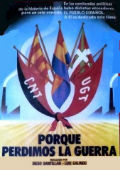
In those days - and I think that
was also through my friend Jesús López-Patiño-, I met Diego
Santillán, the son of the famous Spanish Anarchist Diego Abad de
Santillán. The latter had just returned to Spain, with Franco still
in power, thanks to the intervention of his fellow countryman
Rodolfo Martín-Villa who was an important personality from the
so-called Movimiento. Nevertheless, like many other Phalangists, he
had a strange sympathy towards the anarchists, particularly if they
were old and retired from political activism.
Together with Diego Santillán and his partner Luis Galindo, we
filmed "Por qué perdimos la guerra" (Why We Lost the War), a film
made with archival footage and interviews with politicians from the
Civil War. It was one of the first films to be screened in the
Alphaville Theaters, an experiment difficult to be repeated.